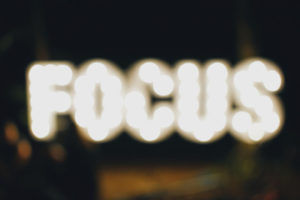Dealing with Distractions: Use Your Veto Power
I sat down to write this, unsure of how to begin. Before I knew it, my mind was off and wandering:
Who sings this song playing in this coffee shop. Do I know that person that just walked in? Oh, I need to reschedule my home internet repair – I’ll do that before I start writing. Focus!
Why are these distractions so alluring? They draw me in and it’s all I can do to get back to what’s most important. Why has it taken me 45 minutes to write the first paragraph!?
Do you get pulled away from what you want to be doing by distractions, urges, and temptations?

Resisting Distractions
I’ve actually been better at dealing with distractions lately since reading Your Brain at Work, by David Rock. It was this excerpt from the book that has really helped:
It seems that you may not have much free will, but you do have “free won’t” (a term coined by Dr. Jeffrey M. Schwartz), which is the ability to avoid urges. However, you have only a small window in which to inhibit a response….
To avoid distractions, it’s helpful to get into the habit of vetoing behaviors early, quickly, and often, well before they take over. And you are more likely to be able to veto an action if you have explicit language for the mental processes involved. It pays to know a lot about how your brain works, so you can catch your brain while you try to work.
In my post How Your Brain Uses Inhibition and Routine, I referenced the fragility of the brain’s braking system, the ventrolateral prefrontal cortex (VLPFC). Because this part of the brain is so easily depleted, you have to be careful not to over-use it. It’s also not very effective at doing its job, especially when you’re hungry, tired, or anxious. So, when you do use it, you can’t squander the effort.
It’s like stopping a child from touching a hot stove. Regardless of how you’re feeling, you can’t risk not being heard. The warning needs to be strong, clear, and immediate.
The Veto Power
Here’s how this applies to resisting distractions, urges, and temptation:
Recently, my wife asked for my attention. But I really wanted to keep watching sports on the television. Then I remembered what I learned about my brain. So the veto came strong and swift. Turn off the TV and face her.
I was tempted to check my phone while driving my car. Immediately, I put the phone away. I didn’t want to even see it.
My morning alarm went off and I was tempted to hit snooze. Can’t contemplate it. Out of bed, I said to myself.
My email inbox is filling up. The urge is so strong to start checking those boxes, but I have a project to work on. Can’t hesitate. Decision made. Won’t open email.
I’d had enough sugar for the day. Dessert was offered. I declined without analyzing the decision. Analyzing it would have worn down my VLPFC, and I’d lose my veto power.
Of course I haven’t resisted every distraction. My scattered brain knows that as I write this after less sleep than normal in a loud coffee shop. I think back to where I didn’t veto early, quickly, and often this past week:
I overate big time one night after a stressful day. I texted friends before falling asleep rather than focusing on my wife. And I studied my son’s sports schedule at work when I should have been paying attention in a virtual meeting. Alas, we’re human.
Though perhaps if we have explicit language for the mental processes involved, we’ll be better at resisting the distractions, urges, and temptations.
Where can you put your veto-power to use?










Comments are closed here.